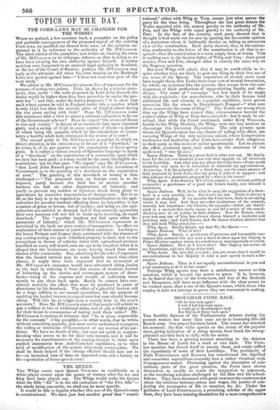THE QUEEN.
Tits Whigs count upon Queen VICTORIA as confidently as a whist-player counts upon the queen of trumps after the ace and king have been played out. The Whigs would make the Queen what the fifth "All' is in the old caricature of "the Five Ails"— the simile being uncourtly, we shall not be more specific. It would be idle to inquire whether this use of the Queen's name is constitutional. We have just had another proof that " consti- tutional," either with Whig or Tory, means just what serves the party for the time being. Throughout the last great debate the Tories appealed with the utmost gravity to the authority of Mr. Fox, and the Whigs with equal gravity to the authority of Mr. Prrr. In the face of the country, each party showed that it thought it had made out its case by quoting the favourable opinion of a statesman whom it habitually decries as taking an erroneous% view of the constitution. Each party showed, that, in his estima- tion, conformity to the letter of the constitution is all that is re- quired—that the constitution is a mere empty form of words. This is nothing new in the faction-fights of Whig and Tory : their great oracles, PITT and Fox, changed sides in exactly the same way on the Regency question. But even Whigs will admit, that it may be worth while to in- quire whether they are likely to gain any thing by their free use of the name of the Queen. The experience of several years must have taught them, that Tories have some sort of mental reservation, by which, on occasions like the present, they escape from the con- sequences of their professions of unquestioning loyalty and obe- dience. The name of " sovereign " has lost much of its magic with the multitude : the non-electors, who by their huzzas lend additional life and vivacity to a popular candidate, have grown somewhat like the waves in SIIAKSPERE'S Tempest—" what care these roarers for the name of king ?" The Tories are wrong when they say the Whigs have caused this ; circumstances beyond the control either of Whig or Tory have caused it : but it must be ad- mitted, that while the Court continued, under King WILLIAM, hostile to the Whig Ministry, the Whigs were not very anxious to discourage this irreverent disposition. The only persons upon whom the Queen's name has any chance of telling with effect, are wavering Whigs of the very moderate school, whose Conservative tendencies and hankering after Corn-laws render their allegiance to their party at this moment rather questionable. Let-us picture the effect produced upon such minds by the utterance of the spell-word, " THE QUEEN." Squire Dubious. There is a great deal in what you say. My family have for the last two hundred years lent their support on all occasions to his Lordship. And what you say about the Corn-laws—if one could implicitly rely upon it—is calculated to diminish my apprehensions. As you say, it is the principle of a fixed duty, not the exact amount of duty proposed by Lord John, that the party is wished to support : and that scheme of a drawback, proposed by—what is his name ? Whig Agent. John Ramsay M'Culloch, esquire ; an eminent political economist ; a gentleman of a good old Scotch family, and himself a landowner.
Squire Dubious. Well, be be what he may, his suggestion of a draw- back is a very sensible idea. But here's the rub. There is always a danger in changing. If we unsettle the Corn-laws, there is no saying where it may end. And there are other institutions of the country, scarcely less important—the Church, for example—which are threat- ened in a manner that really. seems to call for a union of the sound- thinking men of all parties in their defence. Now Sir Robert, what- ever you may say of him, has always shown himself a moderate and judicious man ; and Lord Stanley and Sir James Graham declare that they still bold Whig principles— Whig Agent. But the Queen, my dear Sir, the Queen - Squire Dubious. What of her ? Whig Agent. Surely, a gentleman of generous and honourable sen- timents like yourself will not lend a hand to force upon her Majesty a Prime Minister against whom she entertains an unconquerable aversion. Squire Dubious. How do I know that ? Her Majesty has never, to my knowledge, said any thing of the kind. Whig Agent. My dear Sir, you jest : you are aware that it would be unconstitutional in her Majesty to take a part openly in such a dis- cussion.
Squire Dubious. Then is it not equally unconstitutional in you and your employers to do it in her name ?
Perhaps Whig agents may have a satisfactory answer to this question, which is beyond our power to guess. It is, however, to be feared that love of the Corn-laws, and fear of the Radicals and Dissenters, will have more influence with the class meant to be worked upon, than a use of the Queen's name, which those who employ it dare not attempt to prove they are warranted in making.


























 Previous page
Previous page